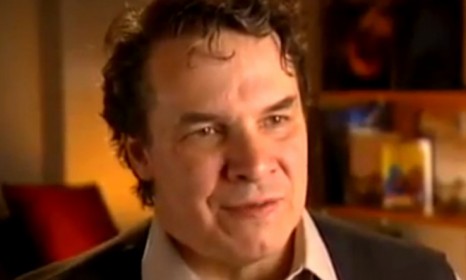The 'Three Cups of Tea' expose: The fallout
A "60 Minutes" report pokes big holes in Greg Mortenson's story, which had inspired millions of people and influenced U.S. foreign policy

A free daily email with the biggest news stories of the day – and the best features from TheWeek.com
You are now subscribed
Your newsletter sign-up was successful
A 60 Minutes report broadcast Sunday night debunked many of the claims that have rocketed Greg Mortenson, author of the bestselling memoir Three Cups of Tea, to international fame. In his 1994 book, Mortenson claimed that after an unsuccessful effort to scale K2, he was nursed back to health by villagers in Korphe, Pakistan, inspiring him to build a girls school in the town. Since then, Mortenson's non-profit Central Asia Institute has taken credit for building dozens of such schools in Afghanistan and Pakistan. The author, meanwhile, has become a speaking circuit fixture, and even worked with the Pentagon to improve U.S. strategy in Pakistan and Afghanistan — Three Cups of Tea is required reading for U.S. soldiers. But the 60 Minutes report says that Mortenson didn't even visit Korphe until a year after his K2 attempt, that many of the schools he supposedly helped build are not operating, and that much of the money donated to his non-profit was spent on luxuries like personal jets. What sort of ripple effects will these revelations have?
Charities should be better monitored: "While the media actively probes into Wall Street banks and Fortune 500 businesses, it rarely takes to task those who have started charities or non-profits," says Elmira Bayrasli at Forbes. That sort of lax oversight "needs to stop," especially since many charities expend more money on rhetoric than on getting things done , falling into the "personality founder" trap, in which the group becomes more about its creator than any mission.
"Disruption isn't just for entrepenurs: The Three Cups of Tea lesson"
The Week
Escape your echo chamber. Get the facts behind the news, plus analysis from multiple perspectives.

Sign up for The Week's Free Newsletters
From our morning news briefing to a weekly Good News Newsletter, get the best of The Week delivered directly to your inbox.
From our morning news briefing to a weekly Good News Newsletter, get the best of The Week delivered directly to your inbox.
We should forget this flawed author and focus on his ideas: These revelations are so upsetting in part because "our country is deeply invested — financially, psychologically, and emotionally — in the region where Mortenson sets his tale," says Macy Halford at The New Yorker. But even if Mortenson turns out to be a fraud, his core message — that education can help abolish extremism — can still inspire America's armed forces. "The hope is that the idea can survive the person who gave it life, should that person be found wanting."
"Three Cups of Tea and the stories we tell"
The book industry should look in the mirror: "The publishing industry’s motto seems to be like the old joke in newsrooms when a particularly juicy rumor surfaces: 'Too good to check,'" says Howard Kurtz at The Daily Beast. Whenever a nonfiction book is discovered to have been a fraud — as happened with James Frey's A Million Little Pieces — book publishers "pass the buck," claiming that fact-checking is too onerous and expensive. But "every other media outlet — newspapers, magazines, networks, Web sites — are expected to stand behind what they publish," and it's time the book industry does too.
"Another memoir meltdown"
A free daily email with the biggest news stories of the day – and the best features from TheWeek.com
-
 Switzerland could vote to cap its population
Switzerland could vote to cap its populationUnder the Radar Swiss People’s Party proposes referendum on radical anti-immigration measure to limit residents to 10 million
-
 Political cartoons for February 15
Political cartoons for February 15Cartoons Sunday's political cartoons include political ventriloquism, Europe in the middle, and more
-
 The broken water companies failing England and Wales
The broken water companies failing England and WalesExplainer With rising bills, deteriorating river health and a lack of investment, regulators face an uphill battle to stabilise the industry